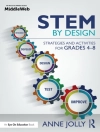Boost student achievement with easy-to-use formative assessment tools
In this second edition of the bestseller, the authors provide research-based and practical formative assessment tools, strategies, and activities that simplify the process of identifying students′ strengths and needs. Updated features include a new chapter on exciting ways to engage learners in self-assessment; more tools for assessing before, during, and after learning; and approaches to help students take ownership of their own learning. Differentiated Assessment Strategies gives teachers:
- Formative assessment strategies for all grade levels and content areas
- Tools for interpreting ongoing assessment data for immediate intervention and planning
- Assessment strategies that provide immediate feedback to teachers and learners
- Methods for determining learner preferences, cognitive styles, and multiple intelligences
- Tips for establishing a positive environment for assessment
Included are surveys, checklists, questionnaires, assignments, graphic organizers, portfolio work samples, rubrics, and more. These user-friendly tools are valuable for assessing all students, informing instruction, and accommodating learners′ individual needs. The final chapter pulls it all together and shows how to integrate formative assessment to improve student achievement.
Innehållsförteckning
Preface
Acknowledgments
About the Authors
1. One Tool Doesn′t Fit All: Introduction
What Is Differentiated Assessment?
Analyzing Your View of Differentiated Assessment
Building the Toolbox to ’Zap the Gaps’
Assessment in the Age of Accountability
What Is the Teacher′s Role in Differentiated Assessment?
Opening the Toolbox
2. Bringing Research and Best Practices to Differentiated Formative Assessment
Processing Information and Memory
Why Students Forget and Why They Remember
Assist the Brain in Memory Processing
Develop Intelligent Behaviors for Assessment
Authentic Assessment
Performance Feedback
3. Creating a Climate for Formative Assessment
The Affective Domain and Assessment
Emotions
Emotional Intelligence
Self-Efficacy
Motivation for Assessment
The Physical Environment
Setting Climate Goals
4. Knowing the Learner
Information Gathering
Gardner′s Multiple Intelligence Theory
Exploring Goleman and Sternberg
More Ways to View Learners
Through Animals′ Eyes
Performance Level Titles for the Assessed Learner
Summary
5. Exploring Self-Assessment
What Is Self-Assessment?
What Is Self-Talk?
Self-Talk for Task Assessment
Teaching Self-Assessment
Why Is It Important to Teach Learners How to Self Assess?
Self-Checking Techniques for Assessment
Assess On-Task Behaviors
Summary
6. Formative Assessment Before the Learning
Personalize Instructional Planning
Engaging Students Before the Learning
Summary
7. Formative Assessment During the Learning
Formative Assessment Tools to Use During the Learning
Summary
8. Formative Assessment After the Learning
Assessment Tools: After the Learning
Bloom′s Taxonomy for Comprehension Assessment
Summary
9. Differentiating Summative Assessments
How Can Standardized Assessments Be Differentiated?
Create a Positive Testing Environment
Give Effective Directions
Teach Test-Taking Skills
Grading
Summary
10. Assessment for Differentiated Instruction and Flexible Grouping
Using Technology for Assessment
Assessment Cubing
Choice Boards
Assessment Agendas
Station, Centers, and Learning Zones for Assessment
Assessment for Flexible Grouping
Evaluating Group Work
Group Discussion: Assessment
Troubleshooting Tools for Group Assessment
Summary
11. Differentiated Instructional Planning Models
Adjustable Assignment Model
Curriculum Compacting Model
Academic Contract Model
Project-Based Model
Problem-Based Model
Summary
12. Planning for Differentiated Assessment
Step Up to Formative Assessment Planning
Content, Process, Product, and Learning Disposition Assessment
Essential Questions for Planning
Assess the Assessment Tool
Teaching Assessment Strategies
Effective Differentiated Assessment Practices
Generate Change for Differentiated Formative Assessment
Summary
Bibliography
Index
Summary
Om författaren
Rita King has more than 20 years of teacher training experience and administrative experience as principal and director of Middle Tennessee State University′s teacher training program in the laboratory school. Most recently, she was an adjunct professor in the Department of Educational Leadership at the university. She now consults internationally in the areas of multiple intelligences, practical applications of brain-based research, differentiated learning, reading and writing strategies, mathematics instruction, creating effective learning environments, and strategies for test success. She is the coauthor of Differentiated Instructional Strategies for Reading in the Content Areas, Differentiated Instructional Strategies for Writing in the Content Areas, and Differentiated Assessment Strategies: One Tool Doesn′t Fit All.












